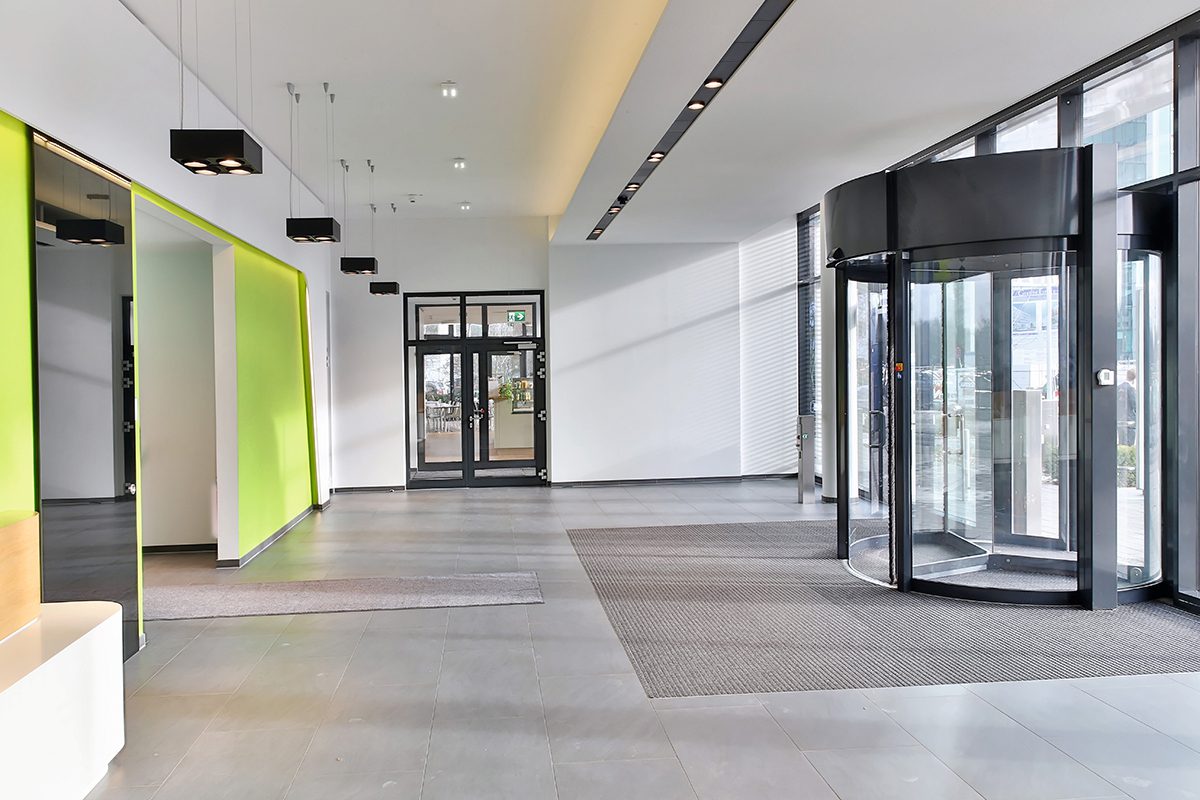Tim Checketts, Head of Specification and Development at dormakaba, discusses the key trends driving specification and product innovation in the commercial door sector.
In association with![]()
Commercial spaces have had to adapt to new challenges presented by COVID-19 over the last year, and consequently, specification requirements for access systems have also shifted.
Infection control
Reducing the spread of bacteria and viruses has become increasingly important across every sector and minimising the number of common contact points at entrances and exits is a key step in infection control. This has meant a greater demand for touchless door automation, with products such as a dormakaba touchless activation switch that utilises infrared technology replacing traditional manual touch pads.
A successful example has been the implementation of the Safe Entry Flow in the essential retail market. Acting as an automatic door operator to control the flow of people into a store, it provides a people counting system that uses 3D and thermal imagining to capture footfall data. The system links to the automatic door operator, allowing entry only when the number of customers in the store is within a pre-set range (depending on the size of the retail unit), therefore creating a physical barrier to prevent overcrowding.
A traffic light system and sound box are linked to the system, providing visible and audible signals to customers at the store entrance, as well as ensuring a simple and enhanced end-user experience. This innovative solution from dormakaba emerged in response to the need for essential retail stores to comply with social distancing requirements, as outlined in the Government’s operating guidelines.
Energy efficiency
Products that provide energy savings for buildings are a trend of the future. With the ST FLEX Green sliding door, dormakaba is underlining its contribution to increasing energy efficiency and improving the sustainability of buildings. The energy efficiency of the doors themselves are also being more widely considered. KTV revolving doors from dormakaba, for example, now deliver energy savings of more than 60 per cent in operation and more than 90 per cent when on standby, compared to traditional revolving doors. Tested to EN 16005 and certified up to two million cycles, it allows an efficient and safe flow of people, low-energy consumption in use, and reductions in temperature exchange, noise and dust.
The FFT FLEX GREEN is the first folding door that provides a maximum clear opening width of 2.4 metres in tight spaces. It also offers outstanding thermal separation, a quiet dynamic operation, and enhanced wind-load resistance. It is particularly suited to emergency exits and escape routes.
Ensuring compliance
Of course, meeting building legislation for commercial spaces is crucial, including compliance with the equalities act and fire regulations. Approved Document B should always be consulted to ensure all areas of compliance are met. This stipulates that all fire door hardware must be CE Marked, have a Declaration of Performance (DoP) from the manufacturer, and be tested by a third-party scheme. All three of these must be present when specifying – if even one is missing, it invalidates other components, and the product should not be considered for installation. As such, independent UKAS-accredited fire certification schemes, such as CERTIFIRE, are increasingly recognised as essential for automatic door operators, as they guarantee performance, quality and reliability of the product, as well as traceability.
The risk of theft is also prevalent within commercial environments, and products that are proven to protect both staff and valuable items are more likely to be specified to provide reassurance. Suppliers like dormakaba have seen an increase in consideration for products that meet RC2 and PAS-24 attack standards, such as PAS-24 Compliant Sliding Doors, and recent upgrades to the dormakaba KTV Automatic Doors, which now include a RC2-certified Night Shield.
Compliance with the Equalities Act must also be considered, and automatic doors are now more widely adopted to ensure employees and customers of all levels of physical ability are able to use buildings safely without compromising security. These considerations go beyond the minimum requirements of the Equalities Act, but are increasingly important to improve the user experience, retain staff, and attract and encourage repeat customer usage.
Commercial spaces are updating to meet new challenges, and this includes more careful consideration for entrance and exit systems. By working with suppliers such as dormakaba, owners of commercial premises are guaranteed unbeatable support from one trusted source; from site-visits and drawings, through to remote software updates and dedicated aftercare where possible.
Contact Details
For more information, please email or visit the dormakaba website.




















